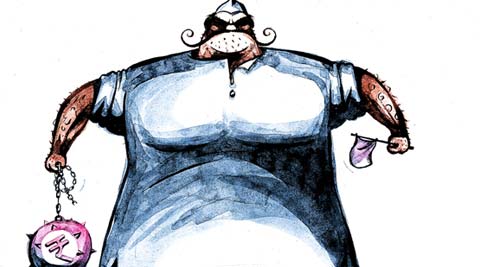One in every three legislators in India has a criminal case pending against them1. According to a 2018 report by the Association for Democratic Reforms, 34 percent of 543 members of parliament (MPs) elected in 2014 have been charged with a violent crime. This number increased from 30 percent in 2009, and 24 percent in 2004. In comparison, as per the Citizens for Responsibility and Ethics in Washington only 2.2 percent of the members of US Congress have been indicted since 1996 2. Even more troubling, 21 percent of sitting Indian MPs have been charged with a heinous crime which include rape, murder or armed robbery.
In spite of the rhetoric of parties fielding ‘worthy’ candidates, nothing prevents them from nominating candidates with criminal backgrounds. Indian law bars convicts from contesting elections 3 . No laws bar individuals with a charge sheet. This move is intentional, in order to prevent state machinery from being utilized to exercise a political vendetta. Despite good intentions, this presents an opportunity that can be exploited.
Criminals crave legitimacy and the validation of political power is unmatched. It helps control law enforcement, which is useful in expanding existing political clout. It’s also financially lucrative. A 2013 study showed that on average the wealth of a sitting legislator increased by a surprising 222 percent.
Criminalisation of Indian politics is a grim reality, and a government comprising of upstanding representatives has become a fantasy. But why do political parties associate with these unsavoury characters?
In his book ‘When Crime Pays: Money and Muscle in Indian Politics’, Milan Vaishnav explains how Goondas and mafias have been a part of electoral politics since the birth of Indian democracy. Booth capture and suppression or mobilisation of voters in favour of political parties that paid them were the main sources of income for criminals between 40s and the 70s. Two major factors led to the criminalisation of politics.
First, as regional parties gained importance across the country, political competition increased. This decreased the certainty of an electoral outcome. For the mafia this increased uncertainty as to who they could support in order to keep law enforcement in check. It became advantageous to enter politics to secure your fate in your own hands. Second, Indira Gandhi’s ban on corporate funding for elections in 1969 pushed a significant source of campaign finance underground. Candidates who could secure large sums of cash and finance their campaigns were preferred by parties, and criminals gained a foothold.
The aam admi also prefers to vote for these crooks. In fact, we see that a candidate with a criminal background is three times more likely to win a seat than a clean one. But why are voters deliberately making these choices? India has abysmally low numbers of public service officials as against its population. Our police-population ratio, for example, is at 1 policeman for every 663 citizens (BPR&D Report, 2017). In comparison the accepted minimal ratio is 1 for every 450.
Access to basic services such as law enforcement, healthcare and welfare schemes is a matter of privilege in our country. Mindful of this, voters prefer candidates “who can get things done”, instead of one restrained by a web of rules, delay and scarcity. Candidates exploit their advantage, projecting themselves as saviours of a caste, religion or other social identities. They promise voters access to justice, health-care, ration shops etc. The procession of cars and distribution of freebies during elections are merely a demonstration of their money and muscle. Given that elections in India are a year-round affair, a politician is rarely ever an administrator. There is simply no incentive to address the efficiency of state machinery. It is far more useful to sustain your political clout.
This nexus of crime and politics is actively supported by inefficient state services and poor access to justice. Our Prime Minister has repeatedly proposed state-funding of elections to clean up campaign financing. The idea is that state-funding might provide transparency to the electoral process. However, creating an accountable system is the challenge. While there are greater incentives for parties to continue fielding self-financing criminals, state-funded election campaigns are unlikely to come to fruition. Among other measures, there are demands to include political parties under the ambit of the RTI Act. It is hoped that this could lend transparency to electoral financing and keep parties in check.
Without a transparent electoral finance system in place, parties will continue to charge their entry fee as a gateway to politics and criminals will continue to thrive. Meanwhile, the Supreme Court and Election Commission have made several attempts to bring transparency to our electoral processes. Most of these orders lack enforcement, as parties prefer to implement them only on paper. Worse, bylaws passed by Parliament tend to twist rules and exploit loopholes. It seems that change can only come from within. But while no party walks the talk, looks like we will continue preaching to the choir in the near future.
- According to the latest reports, this has now become two in every five (40 percent)
- The American expression for being charged with a serious crime
- Section 8 of the Representation of Peoples Act, 1951
Post Disclaimer
The opinions expressed in this essay are those of the authors. They do not purport to reflect the opinions or views of CCS.




